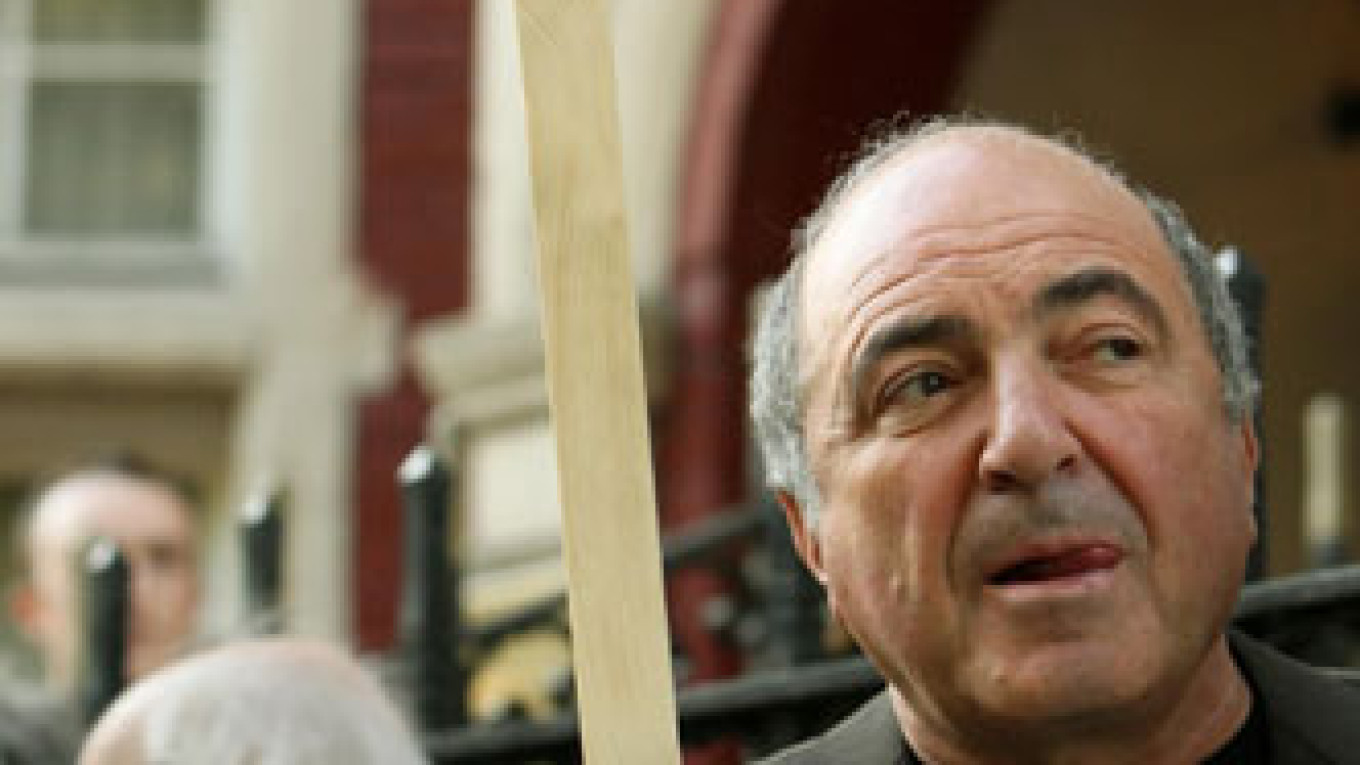The opposition's attempts to stage rallies in Moscow and St. Petersburg got an unexpected boost this week when Russian emigrants took to the streets in several world capitals to express their solidarity.
The 31st rallies, which took place in London, Berlin, New York and Tel Aviv, attracted only a handful of people, but some well-known emigres were spotted among the protesters.
The London rally outside the Russian Embassy was the biggest of the four, attracting 10 participants, including Boris Berezovsky, the self-exiled tycoon once considered the Kremlin's “gray cardinal” and instrumental in bringing Vladimir Putin to the presidency in 2000.
Berezovsky carried a handmade poster reading, “I gave you life, I will also cut you short,” an apparently deliberate misquote of the famous line from Nikolai Gogol's 19th-century masterpiece “Taras Bulba," where Gogol wrote, “I gave you life, I will also kill you.”
Berezovsky was joined by Soviet-era dissident Vladimir Bukovsky and Yevgeny Chichvarkin, former owner of the Yevroset mobile phone retailer who is wanted in Russia on extortion charges but says he is the victim of corrupt police trying to seize his business.
Also attending was Marina Litvinenko, widow of former FSB officer Alexander Litvinenko who sided with Berezovsky against Putin in the early 2000s and died of radiation poisoning in London in 2006. Britain has unsuccessfully attempted to arrest a Russian businessman turned State Duma deputy on murder charges in the case.
Pavel Khodorkovsky, son of jailed former Yukos CEO Mikhail Khodorkovsky, took part in the New York rally, the opposition site Kasparov.ru reported.
Tuesday's rally in Moscow, which attracted from 400 to 600 people, ended in the detention of more than 100. Kasparov.ru described it as a success Wednesday, saying it was the biggest event of its kind since 2009, when the opposition began staging rallies on Moscow's Triumfalnaya Ploshchad on the 31st day of every month.
A smaller rally was broken up by police in St. Petersburg on Tuesday.
The rallies, aimed at drawing attention to Article 31 of the Constitution, which grants freedom of assembly, are regularly banned by city authorities and dispersed by police.
Pundits said the authorities and protesters are in a deadlock, with neither side wanting to give in to the other.
“The authorities are pushing the opposition to create disorder. Instead of reaching a compromise, they have turned Triumfalnaya into a symbol,” Alexei Venediktov, editor-in-chief of Ekho Moskvy radio, told The Moscow Times while watching the rally Tuesday.
“Both sides are trying to push each other to the limit, and they want to see who will give in first,” agreed Alexei Makarkin, an analyst with the Center for Political Technologies. "The farther they move apart, the harder it will be."
But he said Moscow city authorities have recently softened their position toward the opposition, offering alternative downtown locations such as Pushkin Square instead of Triumfalnaya Ploshchad.
A favored spot for democratic movements during the 1990s, Pushkin Square on Aug. 22 hosted a 3,000-member rally against the partial destruction of the Khimki forest, slated to give way to an $8 billion Moscow-St. Petersburg highway. In an apparent response to public discontent, President Dmitry Medvedev ordered a halt to the deforestation last week.
Still, compromise remains elusive, Makarkin said.
“While Pushkinskaya is no different from Triumfalnaya, it is a matter of principle for the opposition," he said. "It will not agree to accept permission [to rally] that is granted from above."
A Message from The Moscow Times:
Dear readers,
We are facing unprecedented challenges. Russia's Prosecutor General's Office has designated The Moscow Times as an "undesirable" organization, criminalizing our work and putting our staff at risk of prosecution. This follows our earlier unjust labeling as a "foreign agent."
These actions are direct attempts to silence independent journalism in Russia. The authorities claim our work "discredits the decisions of the Russian leadership." We see things differently: we strive to provide accurate, unbiased reporting on Russia.
We, the journalists of The Moscow Times, refuse to be silenced. But to continue our work, we need your help.
Your support, no matter how small, makes a world of difference. If you can, please support us monthly starting from just $2. It's quick to set up, and every contribution makes a significant impact.
By supporting The Moscow Times, you're defending open, independent journalism in the face of repression. Thank you for standing with us.
Remind me later.


